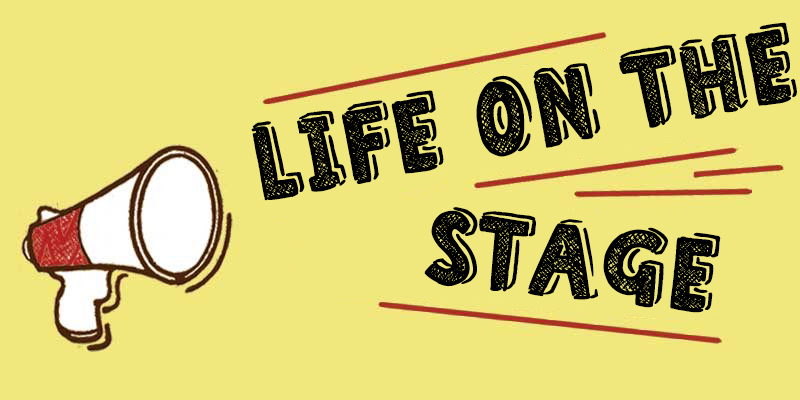Life on the Stage in Utah Comedy: Advice for Aspiring Professional Comedians
Art
Ask any comedian, and they will tell you that comedy may look easy, but it is actually very hard work. As an entertainment form, it is demanding, time-consuming and it can take years for comedians to develop their talent before they start to see any kind of payoff. Yet, we have a pretty large group of entertaining individuals in the state who do this week in and week out. In the final installment of our three-part series on Utah comedy, SLUG sought out three of these hard-working comedians who were willing to talk about the ins and outs of getting up onstage and staying there. We met up at a quaint little late night pancake and waffle house to discuss what it takes to really call yourself a professional comedian.
The Comedians Providing Platforms for Comedy
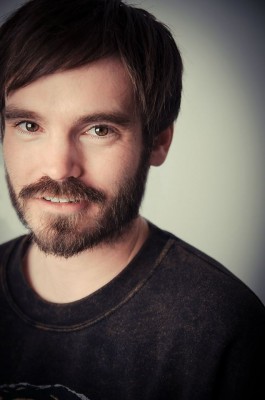 There are more than a handful of professional comedians in the Greater Salt Lake City area that regularly have shows, set up the opportunity for showcases and organize open mic nights. We narrowed down comedians running three shows that have been around for different stretches of time: Comedy and Other Opinions, You’ve Gotta Be Kidding and Adrenaline. These are shows set up by comedians geared toward comedy lovers that showcase different aspects of the genre. They blend stand-up and improv, provide insight into how quick-witted comedians can be and showcase the guts and intelligence that it takes to call yourself a professional comedian.
There are more than a handful of professional comedians in the Greater Salt Lake City area that regularly have shows, set up the opportunity for showcases and organize open mic nights. We narrowed down comedians running three shows that have been around for different stretches of time: Comedy and Other Opinions, You’ve Gotta Be Kidding and Adrenaline. These are shows set up by comedians geared toward comedy lovers that showcase different aspects of the genre. They blend stand-up and improv, provide insight into how quick-witted comedians can be and showcase the guts and intelligence that it takes to call yourself a professional comedian.
Jason Harvey is no stranger to what it’s like to be a hard-working professional comedian, he’s been getting up on stage and entertaining Utah crowds for more than six years. In addition to regularly performing on shows all over the state, Harvey has also set up his own hit show and had a hand in getting other venues off the ground. He started out as most comics do by continuously hitting open mic nights starting with the go-to at Wiseguys Comedy Club every Wednesday, only missing one or two opportunities to get on stage in the first year. It took six or seven months of getting his stage chops until he was ever booked onto someone’s show. Now, he’s got his own monthly special with Comedy and Other Opinions, which is now being featured at the new Club at 50 West downtown and has been going strong for two years.
Eileen Dobbins is a newcomer to the scene who has just hit her 18-month mark for doing stand-up. In that short time, she’s been a fast-rising star. She received the honor of becoming a finalist in the Salt City Comedy Competition at Club at 50 West and like Harvey, she started at Wiseguys open mic on Wednesday nights. Dobbins was about nine months in before getting booked on her first show, Travis Tate put her on a show in Tooele on Valentines day. “Sometimes being a single loser pays off!” she muses. Dobbins started her own monthly show, You’ve Gotta Be Kidding about five months ago. She’s also been seen on Dungeon’s and Comedy and Harvey’s Comedy and Other Opinions. Notably this October she competed at the She Devil Comedy Fest in New York City.
It has been four and a half years since our last comic, Christian Pieper started his comedy career. At the time, he was living in Provo and driving to Salt Lake to do comedy due to the lack of venues in Utah County. He tried to start a show in Provo at Muse Music Cafe called “Cat Fashion Show With Jokes” which lasted about seven months. “My goal was to do something in Provo that would be real comedy” he says. It was at a time when the venue for Wiseguys in Provo had just shuttered its doors. The idea for Cat Fashion Show was “walking the edge” where Provo people would still have a good time and feel comfortable, but get to experience a real comedy show outside of a University or theater troupe. He tried to do a late-night talk show, and he realized that, unfortunately, it wasn’t compelling enough. “I can’t do a show that’s just based on that personality.” Then he tried to produce ‘The Comedians Couch’ where he interviewed amateur and professional comedians as if he were their therapist. Fast forward to where he’s at now, just coming down from the high of being on the Bob and Tom show. Pieper can be seen performing regularly at Wiseguys, both opening for nationally renowned professional comedians, and doing his own once-a-month show, Adrenaline.
How To Start Out As a Comedian
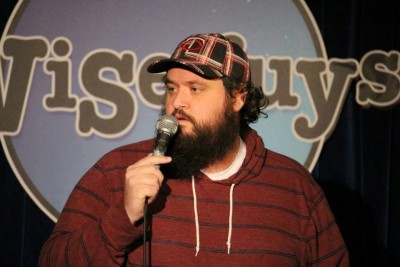 Harvey, Dobbins and Pieper started out in comedy the same way most professional comedians in the state do—by getting the courage to get onstage at an open mic night. These nights are typically free, where aspiring comics can see how it’s done, and seasoned comics can try out new material. If you know where to look, you can find an open mic night nearly every night of the week at multiple locations, ranging from bars to college campuses. Harvey remembers some of his open mic experiences. “It felt like you were at a strip club without strippers,” he says. An open mic is the best way to see professional comedians performing their most raw, untested material.
Harvey, Dobbins and Pieper started out in comedy the same way most professional comedians in the state do—by getting the courage to get onstage at an open mic night. These nights are typically free, where aspiring comics can see how it’s done, and seasoned comics can try out new material. If you know where to look, you can find an open mic night nearly every night of the week at multiple locations, ranging from bars to college campuses. Harvey remembers some of his open mic experiences. “It felt like you were at a strip club without strippers,” he says. An open mic is the best way to see professional comedians performing their most raw, untested material.
Any comic at any open mic has the chance of killing it onstage or failing miserably. When you do comedy in front of your friends and peers they know you and your personality and will understand your humor. Pieper says, “Comics need to learn how to do that in front of real people.” He recommends that as soon as new comedians are ready, they should try to get on get on shows or open mics that have a real audience, such as the Wiseguys open mic. “I think that if you’re starting out, that is the best place to go, because you have a limited amount of time and that is the most important thing as a comic to start out on. It’s ‘I have two to three minutes. How can I be as funny as I can be in two to three minutes?’”
The most important thing with using the short amount of open mic time is to learn how to write solid jokes, figure out timing, and develop punch lines. Pieper has additional advice: “A trick that worked for me early on, that I think people should try, is that If you’re having trouble getting stage time in front of real audiences, which is really common when you’re starting out, you can get stage time in front of other comics. You can go to Mo’s and get 5 minutes, you can get on other small shows, but if you want to get in front of a real audience, go to music open mics, poetry open mics, go to coffee shop open mics where you are the only comedian there and can go up on stage and tell jokes. Those are real people.”
Rookie Mistakes
 Pieper and Harvey both agree that many comics try to start out with really shocking material from the gate to get noticed. “I think that people sometimes act like comedy is just like poetry, it’s some way to express yourself,” says Dobbins. “But when people are paying money to see you, they’re not actually there for you to express yourself, they are there for you to entertain them.” The comics each agree there is a fine line between being edgy and alienating your audience.
Pieper and Harvey both agree that many comics try to start out with really shocking material from the gate to get noticed. “I think that people sometimes act like comedy is just like poetry, it’s some way to express yourself,” says Dobbins. “But when people are paying money to see you, they’re not actually there for you to express yourself, they are there for you to entertain them.” The comics each agree there is a fine line between being edgy and alienating your audience.
“Too many people try to do the dark humor right off,” Harvey says. “Too many people want to be Lenny Bruce or Bill Hicks.” It’s true that many comedians will start out emulating their comedic idols. “Carlin did comedy duo for a long time and was a squeaky clean comic for years,” he says. Many comics should start out doing silly material with the focus to entertain, he thinks. Pieper continues on that note, “It works at open mic to say dark, shocking things and the crowd will laugh. If it’s even a little bit funny, it will kill. And then you go in front of real people and that’s just not what they’re looking for” he says. You want to remember that you don’t want to terrify or disturb your audience. “You’ve gotta be bookable.” With all three of these comedians having experience in booking a comic, Dobbins has additional advice to remember. “People have paid money and are there to feel better.”
The best advice for anyone who wants to be a professional comedian is that, “You have to be undeniable,” says Harvey, who let this pearl of advice from Matt Besser (Improv for humans) sink in. Pieper adds to it, saying, “And it sucks, because I want ‘pretty good’ to be enough. But it’s not. And that’s why it takes 10, 15 or 20 years of hard work and dedication to actually make it as a comedian,” he says. “If you’re good looking, you can be a model. But comedy doesn’t work that way. It’s an art form.” It is one thing to be a fan and a consumer of comedy, but it takes more hard work to become one. “Some people start doing comedy because they see Louis CK and they go ‘I want to be a comedian, too,’” says Pieper. It’s great to have a level to aspire to, but newcomers should realize that they are watching someone who has perfected it as an art form. “You have to be in it for the long haul” Pieper says, in agreement with Harvey that a career in comedy is not instantly gratifying.
All three of the comedians have each been through this process of self-realization to get to where they are now. “I’ve stopped writing sexually premised jokes, I don’t want to tell dick jokes anymore,” says Harvey. Everyone you see onstage goes through a phase where they figure out what they want to use for material, the trick is that you must grow out of using ‘hack’ as a tactic. Pieper says, “Hack doesn’t just mean you’re doing someone else’s joke or a premise that has been done to death. Hack is anytime you’re not original.” He often hosts open mics at Wiseguys, so he speaks from experience. “It happens all the time. I’m at an open mic, watching, and someone does a joke that gets a laugh,” Pieper says. “I don’t know that someone else has done that joke, but I know that it’s easy enough and impersonal enough that someone else could probably do that, and probably has. If that’s the case, it’s not original.” Any comic can tell you that stealing jokes breaks the number one cardinal rule of comedy, but really doing material that hits home takes a little something extra. “I think that originality is more than not stealing jokes, it’s being a real person,” says Harvey. “It’s being honest.”
What to Do When It Gets Rough
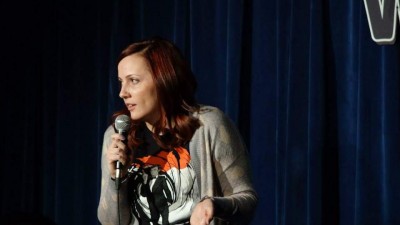 Then, there’s what happens when a comic bombs, and all comics have bombed. They have all had to admit at one point when they weren’t ready for 20 or 30 minutes of stage time. Harvey says, “When you’re starting off, you’re so gung-ho.” Pieper adds,“You’re a hot shot.” And Dobbin laughs, “I still think I’m a hotshot!” However, they all have those moments where not only did the audience not seize up in laughter, but they were dead silent. “I think bombing is important. It’s one of the most important things you can do as a comic because it is the honest reaction of where you are at,” Harvey says. “I ate shit and it felt terrible. I realized I need to work harder and I need to write better jokes.” It’s actually not the worst thing that can happen, as bad as it sounds. Dobbins agrees, “It forces you to write better material,” she says.
Then, there’s what happens when a comic bombs, and all comics have bombed. They have all had to admit at one point when they weren’t ready for 20 or 30 minutes of stage time. Harvey says, “When you’re starting off, you’re so gung-ho.” Pieper adds,“You’re a hot shot.” And Dobbin laughs, “I still think I’m a hotshot!” However, they all have those moments where not only did the audience not seize up in laughter, but they were dead silent. “I think bombing is important. It’s one of the most important things you can do as a comic because it is the honest reaction of where you are at,” Harvey says. “I ate shit and it felt terrible. I realized I need to work harder and I need to write better jokes.” It’s actually not the worst thing that can happen, as bad as it sounds. Dobbins agrees, “It forces you to write better material,” she says.
Pieper recounts a moment he had about nine months into his comedy when he was doing a show in Idaho. Within the first three minutes of his set, he had gotten zero laughs when a girl in the audience yelled out “You’re not funny!” He realized something important- that he wasn’t prepared. He remembers that he got 30 minutes of silence, his whole set. “You get off stage, you’ve got the tears welling up in your eyes, and you think ‘well, that’s as bad as it’s going to be.’ And I haven’t been afraid onstage since. I didn’t die.” It’s almost a rite of passage, after that first time a comic bombs, there is only one direction, and that is up.
The comedians recount some of the harder sets they’ve endured, and that it really does happen to everybody. “Once you do stuff like that, there’s nothing that’s going to hurt you,” says Pieper. There may be more times, many more, that even seasoned comics will fail to get the audience where they want them and will get minimal laughter. After that first time “It doesn’t hurt anymore, it’s an unpleasant reminder that it can happen” Harvey points out. Dobbins admits that she hasn’t hit that point yet. “It hurts like hell,” she says. “The waves of rejection that wash over you—you’re like, ‘I’m drowning. That’s it, I’m going to let go and sink into this abyss of depression and all of this rejection.’” She’s massively positive about it, though. All it takes is one person to like you to make you want to go back up. “But then you have a good show a couple of weeks later,” says Dobbins. “Nothing feels better than coming down off of the stage and knowing that people thought that the stupid jokes you made up in your mind were funny. That’s the best feeling.”
Virtually all Professional comedians have been heckled. They’ve been called names onstage. This only ends up making them better, but only if they are ready for that challenge. “I’m so glad nobody put me on a show six months into open mics,” Dobbins says. “I wasn’t ready. It would’ve been devastating.” Starting out getting big showcase sets, or paid shows too early in the game may not actually be helpful, though newcomers get excited for that moment. Harvey says, “I’ve seen it ruin people because I’ve seen their creative writing process stop.” It depends on the new comic gauging their own level of readiness, and being honest about it. Harvey has advice on this matter, “It’s important to not only listen onstage to the laughs you get, record your set, and pay attention to the other comics and the laughs they are getting.” When you hit a point that you can bring the audience along for the ride, just like those you are opening up for, you know you’re ready for bigger things.
Professional Comedians: What It Takes
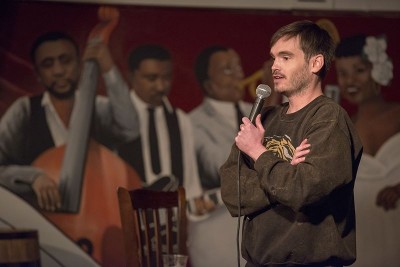 After the rookie mistakes and the inevitability that, as a comedian you will bomb at one point, then it’s a matter about honing your skills onstage. “That’s the one thing, if you want to get better in comedy and it’s something you want to pursue then it’s something you have to be committed to writing as often as you can possibly write and going up on stage as often as you can possibly get up onstage,” says Harvey. He says that it’s important to know how to rework jokes, know what to keep, what to scrap and what to completely change.
After the rookie mistakes and the inevitability that, as a comedian you will bomb at one point, then it’s a matter about honing your skills onstage. “That’s the one thing, if you want to get better in comedy and it’s something you want to pursue then it’s something you have to be committed to writing as often as you can possibly write and going up on stage as often as you can possibly get up onstage,” says Harvey. He says that it’s important to know how to rework jokes, know what to keep, what to scrap and what to completely change.
Pieper thinks there are different levels of dedication. “It depends on what your goals are, if you want to just do comedy and have fun doing it as a hobby, keep doing it,” he says. “If you want to be a professional comedian then you better work hard, have some talent, and stick with it. And you better not bomb all the time.” Everyone has their own learning curve, there isn’t any class or manual that can prepare you for the real deal. “There’s lots of different avenues you can pursue” he says. Pieper has hit a point pretty early on in just over four years where he’s traveling for shows and making more of a name for himself. “If you’re a little bit funny and you work hard, you can make 40 grand a year hustling all over the country and having a horrible life style.” Despite how important hard work can be to professional comedians who thirst for success, Pieper warns that one’s hard work doesn’t always pay off. “If you’re hitting stages for years and nothing is going anywhere for you, maybe comedy is not for you,” he says.
Harvey recounts his own journey and how he continues to grow onstage. “Sometimes I’ll write a joke that I’m proud of and I feel like it’s progressed from the last bit of jokes that I was writing,” he says. It’s a process, and it works for him. Pieper has a similar process. “Every six months I look back and watch sets from six months ago and I’m like, ‘That was dog shit, I’m a lot better now.’” he says. Although he says that not everyone is cut out for comedy, he does think that you should realistically gauge your own abilities and progress. “If you’re still getting better, then why quit?” He adds, “I think that there’s a point that people get to, a level where they are reliable comedians that you can put on any show and they’ll do well. That happens at a different point for different people. As long as you’re progressing toward that and you’re willing to be patient, it might take several years, but you’ll get there.”
Where To Start
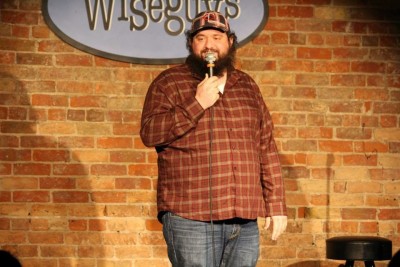 If you are looking at getting into the stand-up business, you’ll want to start out researching local comedy. Find a few buddies to go with to an open mic of your choice. Be prepared to see all levels of comedy, and decide if that is the best atmosphere to start out in. After going a few times to see what others are doing, prepare a good solid two to five minutes of material. All it takes at that point is the guts to get onstage and remember it.
If you are looking at getting into the stand-up business, you’ll want to start out researching local comedy. Find a few buddies to go with to an open mic of your choice. Be prepared to see all levels of comedy, and decide if that is the best atmosphere to start out in. After going a few times to see what others are doing, prepare a good solid two to five minutes of material. All it takes at that point is the guts to get onstage and remember it.
Utah has several comedy clubs that cater to all things in the genre. However, if the club scene starts out as too intimidating, there are also diners, coffee shops, and small bar shows you can check out as well. Ask amateur and professional comedians for their best spots they know of, or do a little research into what is closest in your area.
The Utah comedy scene is actually a pretty close knit group of very supportive individuals. They are willing to answer questions and provide feedback to newcomers. If you have ever wanted to get out there and see what it’s like, there’s no better time than the present. Whether it is supporting a local show by being in the audience, or trying your hand at a few minutes, you may be surprised at how much fun these shows can be.
Get the scoop on SLC’s burgeoning comedy scene by checking out SLUG’s coverage of local comics, and make sure to trek down to the Urban Lounge on Dec. 17 for our first-ever local comedy Localized showcase!
For more information on standup comedy in Utah, check out the other pieces in this series!
Diverse Comics: Something for Everyone in the Utah Stand-Up Scene
We Live For Funny: The Evolution Of The Utah Comedy Scene
